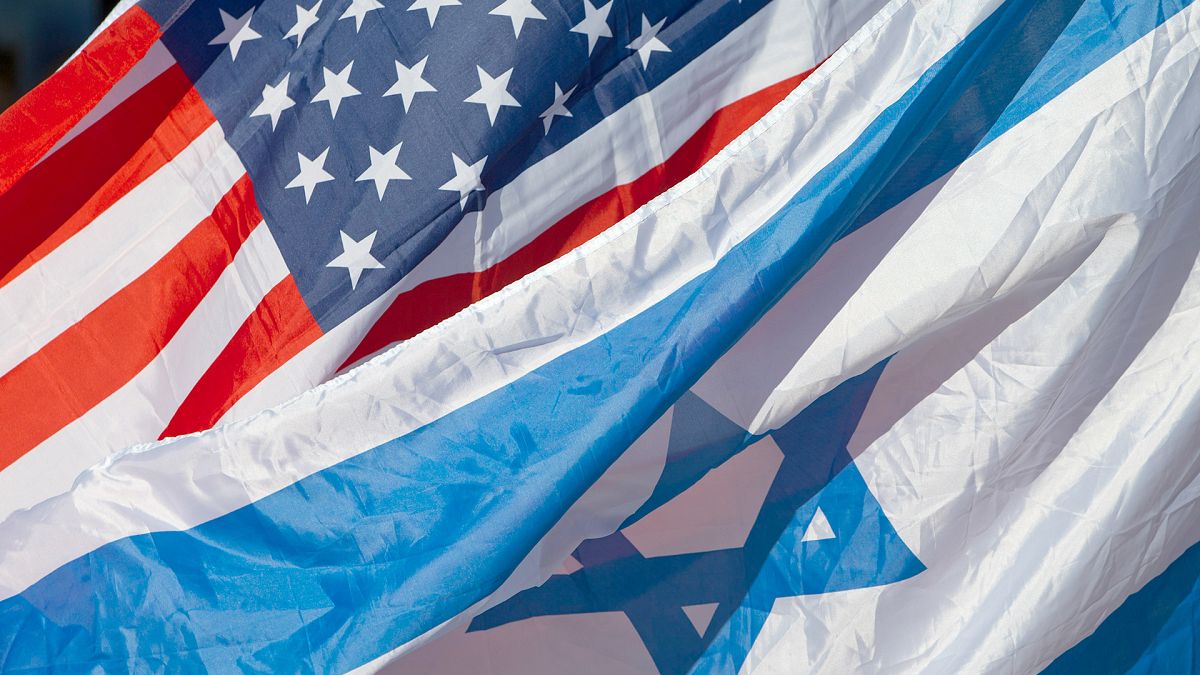Analysis: How is the Middle East conflict affecting the US election?

As the the US presidential election campaign reaches its peak with just one month to go before the vote, Euronews examines how influential the heightened tensions and simmering conflict in the Middle East are on US voters.
Earlier this week, the two lesser-known running mates of Donald Trump and Kamala Harris squared off in a vice-presidential debate in New York City.
While Senator JD Vance (R-Ohio) and Governor Tim Walz (D-Minnesota) faced a heavy dose of domestic-focused questions, the opening topic of the night was the ongoing fight between Israel and Iran-backed Hamas.
The question came just hours after Iran launched a largely unsuccessful barrage of ballistic missiles aimed at Israel, highlighting the importance of the current Middle East conflict and the impact the war could have on voters come November.
As the US election draws closer in a race where polls show a neck-and-neck contest between Trump and Harris, Iran’s growing direct involvement with Israel could make the Middle East conflict a higher priority issue for American voters.
While Benjamin Netanyahu would likely prefer a more supportive Republican White House led by Donald Trump, the Israeli prime minister nonetheless sits in a position of greater flexibility and autonomy than he has been afforded in months.
Tehran’s bombardment of Israel came as a response to a series of blows that Israel landed on Iran’s allies, including the assassination of Hamas’s Ismail Haniyeh in Tehran and the assault on Hezbollah in Lebanon.
The calculated risk Iran could lead to further escalation by Israel, which has been emboldened by recent successes in the war. While Joe Biden’s administration will seek to tamper any escalation, both Netanyahu and the Democrat-led White House know that matters are complicated by the election just one month away.
Americans backing Israel
Most US voters are supportive of Israel in the ongoing conflict. According to an August survey by the Chicago Council on Foreign Affairs, 60% of Americans favour the US supporting Israel militarily until Hamas releases all hostages, while half of Americans favour such support until Hamas is entirely dismantled.
While Americans explicitly do not want to be directly involved in another Middle East conflict, more than 60% of them support the US playing a positive role in resolving problems in the region. Among Jewish and Muslim Americans, those numbers are even higher.
Public support for Israel stretches beyond party lines, though the details matter. Republican voters consistently poll with over 70% in support of Israel, weapons aid and their military actions.
Democrats’ support is more tenuous but remains above 40% in favour of aid, although many Democrats think that the US is doing too much for Israel. Across age brackets, only among voters 18-29 does the support of Israel fall under 55%. Among older Americans, the country’s most reliable voting population, more than 70% of voters support Israel.
The Palestinian Authority, meanwhile, is seeing its support in America drop, according to the Gallup. As of March, US support for Palestine’s leading body fell to just 18%, its lowest in five years.
Although Israel holds strong support among a plurality of Americans, Israel’s Prime Minister remains more controversial.
Per Gallup, only 35% of Americans hold a favourable view of Benjamin Netanyahu, with 45% holding an unfavourable view. Netanyahu’s support, however, is strongly split along party lines, with 66% support among Republicans compared to just 12% favorability among Democrats.
Pressure to be pro-Israel
While the US public support for Israel doubtlessly plays a role in each campaign’s posture toward the conflict, there is also the role of special interests and, in an election year, donor interests.
The American Israel Public Affairs Committee (AIPAC) is one of the most important lobbies and campaign contributors in Washington.
AIPAC has already spent over $17 million in campaign donations, with more than $15 million (€13.7m), or 86.9%, contributed to Democratic Party candidates and organizations. AIPAC has spent countless days over the past year to boost aid to Israel, wielding more influence in an election year.
The Democrats are also the beneficiaries of donations from countless private donors with an interest in supporting Israel, from Hollywood to New York City.
There is also the influence of the Electoral College, which proportions 538 votes between the US states for choosing the president. The Electoral College system turns a series of “swing states” into the ultimate decision-makers for the US presidency.
Chief among the battleground states is Pennsylvania, where more than 300,000 Jewish voters make up a larger-than-average percentage of the state’s voters. Nevada, another crucial swing state, also boasts an above-average percentage of Jewish voters.
In each of America’s roughly seven swing states, the margins should prove to be razor-thin and will likely come down to a few thousand votes. Neither campaign can afford to take any voting bloc for granted.
Harris and the Democrats walk the high wire
President Biden has time and again repeated his support for Israel, pointing to the aide package his administration helped to deliver. The president, however, is of a different era within his own party.
Since the war in Gaza broke out last autumn following Hamas’s surprise attack, the Democrats have found themselves split between traditional support for Israel and a younger, strongly progressive sect of the party that is more sympathetic to Palestinians, blaming Israel for the ongoing conflicts in the region.
The divide among the Democrats leaves Vice President Harris with a fine line to walk as she navigates her snap candidacy.
While Harris has repeatedly voiced her support for Israel and backed her boss’s strategy in the conflict, she has a history of making comments that suggest her support is less steadfast than Biden’s, perhaps a nod to the base of the party that is much more critical of Israel.
Last week, Democratic New York Congresswoman Alexandria Ocasio-Cortez said in an interview that she believes that Harris is “receptive” to the concerns of the Democratic base over the conflict.
Ocasio-Cortez pointed to the myriad university protests in support of Palestine, noting the importance of the progressive and youth vote for Democrats.
Harris’ statements on Israel remain closer to those of Biden than Ocasio-Cortez, with her campaign likely seeing the same data that shows larger public support for Israel, as well as pressure from donors and lobbyists.
Meanwhile, Harris is failing to amass support among the Arab American community. A September poll from the Council on American-Islamic Relations showed Harris trailing Trump with Arab American voters, historically a 2-1 advantage for Democrats.
In 2020, Biden won more than 60% of the Arab American vote, 16% better than Harris currently projects based on the poll.
With polling well within the margin of error, Harris cannot afford to drop support among Jewish voters, giving Israel and Netanyahu a longer runway to act without major public oversight from the White House’s preferred successor.
The Republican position and a boost for Bibi
Despite Republicans’ increasingly isolationist views in recent years under the Trump MAGA banner, Israel has managed to maintain the right’s hawkish support.
In response to Tuesday’s debate question regarding an Israeli pre-emptive strike on Iran, Trump’s running-mate JD Vance affirmed his campaign’s belief that the US should support Israel to do whatever they feel is necessary to defend their home and people.
Republicans have long been hawkish towards Iran. During the 2016 campaign, Trump regularly blasted Hillary Clinton and President Barack Obama for negotiating with Tehran and releasing billions of dollars in frozen assets, a deal that Trump dismantled once he was inaugurated.
Trump, Vance and their surrogates have regularly driven the message that, under Trump’s administration, the current global chaos from Ukraine to the Middle East was not the norm.
They blame the conflicts on “weak” leadership of Biden and Harris. Their unabashed support of Israel has coincided with a larger narrative of peace through strength — a message that may be working on many Americans.
Iran’s moves and counter-moves will only increase American sympathy for Israel. The latest attack has given Israel the freedom to act more aggressively while American leaders walk on eggshells ahead of the election next month. That could soon end.
If Harris wins, Israel could find itself held to a new set of conditions laid out by a less-friendly White House.
If Trump takes the White House again this November, Netanyahu will find himself in a stronger position than he has seen in years. For now, Netanyahu can continue to operate from a position of strength and confidence.
World News || Latest News || U.S. News
Source link



